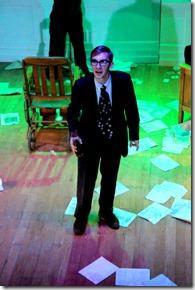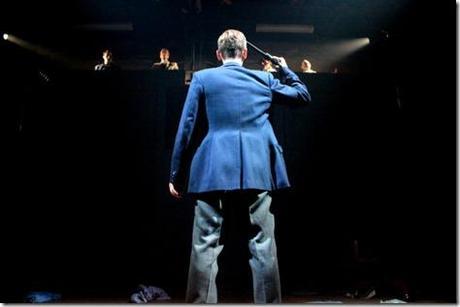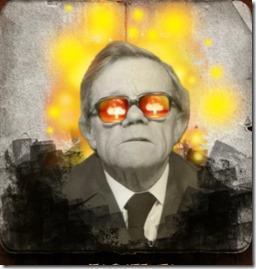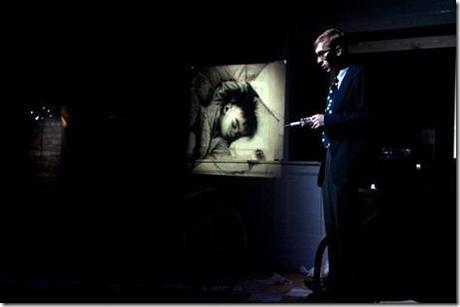
The Half-Life of Memory
Written by Jason Lindner
Directed by Sophie Blumberg
DCASE Storefront Theatre, 66 E. Randolph (map)
thru June 29 | tickets: $15 | more info
Check for half-price tickets
Read review
Stream-of-consciousness lecture play too manic to care

Cold Basement Dramatics presents
The Half-Life of Memory
Review by Lawrence Bommer
There’s some putative method in the madness of Cold Basement Dramatics’ Chicago premiere. This scrambled memory play by Chicagoland native Jason Lindner is based on an author’s relative who was a Manhattan Project physicist and Glencoe resident. (He moved there because he believed that the North Shore suburb would escape major radiation from a nuclear hit on Chicago.) In a wildly fanciful, stream-of-consciousness lecture, Lindner crazily imagines him as former particle physicist Salek. Years later, the scientist is now dependent on drugs and verging on suicide. Salek recalls—well, what doesn’t he? Just about everything that happened to him up to the first controlled chain reaction and nuclear blast at Trinity on July 16, 1945, as well as the tragic deaths of his sister, wife and daughter. And much, much more.

The approach of death is supposed to concentrate the mind, but for Salek (played with amphetamine zeal by Mark Maxwell) it only triggers a pile-driving phantasmagoria of incoherent recollections. It’s hard to care here: So little is at stake and we’re never ahead of the manic action.
Illustrated by slides of mushroom clouds and shredded bodies, and mutating like a fever dream, Salek’s mind is propelled by equal torrents of denial and guilt. Like a plutonium leak, it spills over into desperately dramatized, metaphor-mad illusions—a dreadful vaudeville scene, snapshots from his Polish origins and dementia-laden flashbacks from his marriage. Then there’s the haunting, goading image of the Eyeball Person, a Hiroshima burn victim who also plays a part in this demonstration of what Salek calls “radioactive consciousness.” (Her croaking out the popular song “Nagasaki” is typical of this script’s pointless overkill.)
Buttressed by persuasive performances, director Sophie Blumberg moves Lindner’s too-long, free-associating circus fairly fast. She needs to–in order to disguise the T.M.I. that ultimately weighs down Lindner’s (atomic) blast from the past. (The hodgepodge potpourri of assorted European accents doesn’t help.) Unfortunately, by the welcome end of this tedious mess the real question of accountability–for inventing nuclear weapons in order to drop them onto two Japanese cities–gets lost in a mishmash of mutating memories.
If this play were a physics equation, it would yield too much unprocessed energy. The Half-Life of Memory suffers from a distracting if not disturbing penchant for projecting human emotions onto scientific formulae. An ethical cop-out, it falls far short of a moral-minded debate about a once and future danger.
Rating: ★★
The Half-Life of Memory continues through June 29th at DCASE Storefront Theatre, 66 E. Randolph (map), with performances Thursdays-Saturdays at 7:30pm, Sundays 2pm. Tickets are $10-$15, and are available by phone (800-595-4849) or online through Tix.com (check for half-price tickets at Goldstar.com). More information at ColdBasement.org. (Running time: 2 hours, includes an intermission)

Photos by Liz Siedt
artists
cast
Mark Maxwell (Salek), Teagan Walsh-Davis (Helle), Stephen Dale (Robert Oppenheimer), Daniel Sappington (Edward Teller), Dan Planz (Enrico Fermi), Michael Sater (Albert Einstein), Shozzett Silva (Eyeball Person), Laura Barati (Nurse, Tauba)
behind the scenes
Sophie Blumberg (director), Sarah Jo White (costume design), Matt Reich (sound design), Jeff Shields (prop design), John Kelly (lighting design), Dustin Pettigrew (set design), Sam Hubbard (violence design), Sammi Grant (dialect coach), Janelle Boudreau (stage manager), Sam Barickman (technical director), Danielle Whaley (production manager), Alex Kump (asst. production manager), Jeremy Ehlinger (casting director), Liz Siedt (photos)
14-0611

